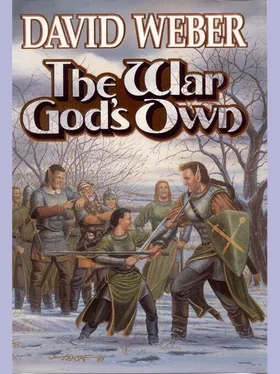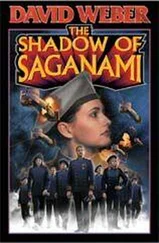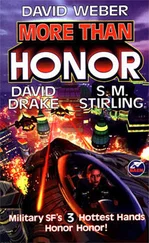"Good, my son." The knight-captain made his words a gentle reprimand and was rewarded by seeing the younger man's flush darken. Whatever else he might be, Vaijon wasn't stupid. He recognized a rebuke even when he truly failed to grasp the reason for it. "This is a very important day for our chapter, Vaijon," Charrow went on in a more normal voice. "It is up to you to represent us-and Tomanāk -properly."
"Of course, Sir Charrow. I understand. And I'm honored by the trust which led you to select me for this duty."
Vaijon went down on one knee and bent his head once more, and Charrow gazed down at him for a moment. Then he laid one scarred hand, blunt fingers still strong and calloused from regular practice with sword, bow, and lance, upon the gleaming gold hair.
"Go then with my blessing," he said, "and with that of the God. May his Shield go before you."
"Thank you, Sir Charrow," Vaijon murmured. Charrow's mouth quirked in a small smile, for there was a trace of impatience in the younger man's voice now to mingle with his lingering irritation. Clearly, if he had to do this, he wanted to get it over with as soon as possible.
The master of the chapter considered pointing out that this was not precisely the correct attitude for one being sent forth on the War God's business, but then he thought better of it. Vaijon's attitude, after all, was one reason he'd selected the young knight-probationer for this particular task, and so he settled for patting him on the shoulder and left.
When he looked back from the doorway, Vaijon was back on his feet and gazing once more into the mirror. The knight-captain shook his head with another smile. It was a wry smile, and if the young man before the mirror had been even a little less involved with his reflection, he might have felt a twinge of alarm at the sparkle of amusement in his superior's eyes.
At twenty-five, Sir Vaijon of Almerhas, Baron Halla, fourth son of Earl Truehelm of Almerhas and cousin to Duke Saicha, Royal and Imperial Governor of Fradonia, was a handsome young man. He was also a very large one (he stood six inches over six feet, with broad shoulders), and as the son of a great noble and heir to a barony in his own right on his mother's side, he had begun his weapons training early. He moved with the trained grace of a warrior, his muscles had much the same solidity as well-seasoned oak, long hours on the training field had gilded his complexion with a bronze which lingered even in midwinter, and the deep green surcoat of the Order of Tomanāk set off his hair and flashing blue eyes admirably.
Sir Vaijon was well aware of all those facts. Indeed, although it would have been unbecoming to admit it, he knew he took a certain pride in them. As his father was fond of pointing out, after all, one had a duty to one's blood-and, of course, to the Order-and presenting the proper appearance was part of discharging that duty. When one looked the part of a knight of the Order and spoke with the confidence of a gentleman, one's words carried additional weight even with one's peers and impressed lesser folk into obeying one without bothersome argument.
In moments of honesty, Sir Vaijon was prepared to admit that his pride in his birth and appearance stemmed from more than a simple awareness of how they served him in the performance of his duties. To be sure, the administration of justice was the primary purpose of the Order, and it was clear to Vaijon that an imposing presence and the judicious use of his aristocratic titles would… encourage others to defer to him when he stepped in to settle disputes. He couldn't change who he was, anyway, so why shouldn't he embrace his identity and use it to the Order's benefit?
Yet as he listened to the door close behind him and used the mirror to check his grooming one last time, Vaijon knew Sir Charrow disagreed with him. The knight-captain considered his firm sense of who he had been born to be a flaw, though Vaijon had never been able to see why. Or, at least, to see that it detracted in any way from the performance of his duties. Not even Sir Charrow could fault his passion for truth and justice; indeed, the master was more likely to suggest in his gentle way that Vaijon might want to temper his quest for justice with a bit more compassion. Nor could he fault Vaijon as a warrior, for it was a simple fact that no one had ever bested him-in training or actual battle-since his seventeenth birthday. Which was only to be expected in an Almerhas of Almerhas, of course. And in one who had known almost from the day he learned to walk that he was destined to be a knight of the war god.
Yet the master seemed to have reservations even there, as if he thought Vaijon's confidence in his abilities constituted some sort of overweening pride, even arrogance. But how could simply admitting the truth of one's own capability be arrogance? And it wasn't as if Vaijon thought that he alone deserved all the credit for his prowess. He knew how much he owed his instructors for his superlative training, and he was well aware of how fortunate he was in terms of the size and native strength with which Tomanāk had blessed him. Indeed, that awareness of the favor the Sword of Light had shown him was one of the reasons he longed to administer justice among the little people of Orfressa, which was why he was often baffled by the master's concern when all he sought was to be worthy of the trust Tomanāk had chosen to repose in him.
When Sir Charrow spoke, Vaijon always listened, of course. It was his duty as a knight-probationer, and no Almerhas of Almerhas ever failed in his duty. Yet closely as he listened and hard as he pondered the master's words, he could not convince himself Sir Charrow was right. Justice was justice, truth was truth, and skill at arms was skill at arms. To deny or compromise any of them was to undercut all the Order stood for.
And as far as his birth was concerned, Vaijon had never claimed precedence over any other member of the Order, however low born those others might be. Indeed, he took a certain pride in the fact that he never had. Unlike many other chivalric orders, the Order of Tomanāk stood open to all, and fitness for membership was judged solely on the applicant's merits. It was, perhaps, regrettable that such a policy allowed the occasional lowborn embarrassment entry, but it also meant that only the most qualified warriors from the ranks of the gently born were admitted, as well. And however common some of his brother knights might be, Vaijon knew their hearts were in the right place, else they had never been admitted in the first place, which made up for a great deal. Besides, the better born and more sophisticated members of the Order-like, for example, Sir Vaijon of Almerhas-could normally cover their occasional public gaffes, and Vaijon defied anyone to name one time when he had treated any of them with less than true courtesy.
And so far as those who were not one's brothers were concerned, neither Tomanāk's Code nor any law or rule of the Order specifically required one to actually socialize with inferiors so long as one saw to it that they received justice. Still, he couldn't escape the notion that Sir Charrow felt he should be more… more-
Vaijon couldn't lay his mental grip on the exact word to describe what Sir Charrow wanted of him, but he knew it was there. The knight-captain didn't lecture him-that wasn't the way of the Order-but there had been enough elliptical references to the character traits of a true knight to leave Vaijon with no doubt that Sir Charrow was unconvinced he possessed them all in proper proportion. More, Vaijon remained only a knight-probationer after almost three full years. He knew his failure to advance beyond that status had nothing to do with his prowess, which could only mean Sir Charrow had delayed his promotion for other reasons, and Vaijon had noted (though no proper knight could admit he had) that the master had a tendency to single him out for particularly onerous duties from time to time. Not dangerous ones, and certainly not ones to which a knight of the Order could object, yet subtly… demeaning? No, that wasn't the word either. It was as if… as if Sir Charrow hoped that by burdening him with tasks better fitted to the more humbly born he could force Vaijon into some sort of insight.
Читать дальше












